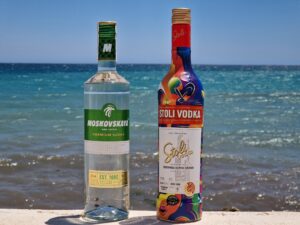 On June 17, 2024, in the Netherlands, 18 Benelux spirits trademarks owned by Russia – including those for the iconic vodka brands STOLICHNAYA, MOSKOVSKAYA, and NA ZDOROVYE – were auctioned off in one single lot for €1.6 million. Some of these trademarks are also registered at the EUIPO claiming seniority. Interestingly enough, the auction terms included also the copyrights related to the vodka trademarks.
On June 17, 2024, in the Netherlands, 18 Benelux spirits trademarks owned by Russia – including those for the iconic vodka brands STOLICHNAYA, MOSKOVSKAYA, and NA ZDOROVYE – were auctioned off in one single lot for €1.6 million. Some of these trademarks are also registered at the EUIPO claiming seniority. Interestingly enough, the auction terms included also the copyrights related to the vodka trademarks.
In 2022, these trademarks were seized to partially enforce the $50 billion arbitral award rendered in 2014 against Russia in favour of the former majority shareholders of the Yukos oil&gas company for the expropriation of their enterprise back in 2003.
A first auction was held in 2022 during which two bidders each posted the €250 thousand deposit to have the chance of winning the exclusive rights to use these trademarks for class 33. However, on that occasion the winning bid was rejected for being too low.
Curiously, during the first two decades of the 2000s these popular vodka trademarks were at the centre of another legal battle involving all Europe between Russia’s State-owned FKP Sojuzplodoimport and Spirits International B.V. (hereinafter ‘Spirits’, a Dutch subsidiary of the Luxembourg-based SPI Group and affiliated to the Swiss ZHS IP Europe Sàrl). The dispute concerned whether these brands were properly acquired by the of the SPI Group following the 1997 privatisations in the wake of the Soviet Union collapse. In 2012, Dutch courts found that Spirits never became the owner of the contested brands since the alleged transfer never occurred from the rightful owner, which remains the State entity. Further, the same decision concluded that the use of geographical indications of origin such as ‘Russian’, ‘Russian vodka’, ‘imported from Russia’ and/or ‘imported Russian vodka’ by Spirits constituted misleading advertising under Article 6:194(b) of the Dutch Civil Code, since Spirits’ vodka is not actually produced in Russia.
In 2021 – just a year prior to the seizure of the vodka trademarks – another Dutch court ruled that of a total of 25 national word and figurative trademarks for STOLICHNAYA and MOSKOVSKAYA registered in 13 countries, the Russian State entity was the legitimate proprietor of six (the UK, Ireland, Cyprus, Sweden, Italy and the Czech Republic), thus upholding Russia’s trade mark infringement claims against Spirits. Simultaneously, the challenged SPI Group’s Benelux trademarks were declared invalid. Whereas, in the remaining 7 countries concerned (Switzerland, France, Norway, Denmark, Spain, Portugal and Poland), the court found that the contested brands were validly registered in the name of Spirits based on the respective national laws.
Observations and Predictions
The recent auction provides some insights on the value of a family of liquor brands and how they are appraised in the market. Thus, it could be used as a helpful comparable for future transactions to avert overinflated estimation.
Definitely, this auction represents an interesting strategy worthy of being replicated when enforcing damages awards against foreign States or State entities. Obviously, States will necessarily register their trademarks in jurisdictions outside their own, if they want to protect the IP rights of the goods and services that they directly export or provide in those countries. The courts and trademark offices of such third countries will certainly adopt a more neutral stance than the courts of the State trademark-proprietor when executing an arbitral award against such IP assets, which by their location – outside of the sphere of control of the affected State – will be relatively easy to attach. To prevent this, States may consider registering their eligible traditional goods as PGI/PDO, which as such cannot be seized in Europe.
Nevertheless, the whole situation is another cautionary tale as to the global fragmentation of trademark ownership as a result of the territorial nature of trademark rights (similarly, to the ‘Schweppes case’ where the trademark belongs to two different competing business entities).
Finally, whoever won this auction may not be immune from further legal proceedings, if it uses such trademarks – which either mention or evoke Russia – for vodka produced outside Russia. Should this be the case, Russia may initiate cancellation proceedings at the EUIPO under Article 7(1)(g) EUTMR for the deceptive use of such trademarks as to the geographical origin of the goods. So, the fight may go on.
_____________________________
To make sure you do not miss out on regular updates from the Kluwer Trademark Blog, please subscribe here.


